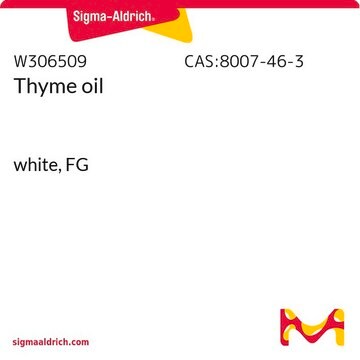W224511
Carvacrol
natural, 99%, FG
Synonym(s):
5-Isopropyl-2-methylphenol
About This Item
Recommended Products
grade
FG
Fragrance grade
Halal
Kosher
natural
Agency
follows IFRA guidelines
meets purity specifications of JECFA
reg. compliance
EU Regulation 1223/2009
EU Regulation 1334/2008 & 178/2002
FDA 21 CFR 117
Assay
99%
refractive index
n20/D 1.522 (lit.)
bp
236-237 °C (lit.)
mp
3-4 °C (lit.)
density
0.976 g/mL at 20 °C (lit.)
application(s)
flavors and fragrances
Documentation
see Safety & Documentation for available documents
food allergen
no known allergens
fragrance allergen
carvacrol
Organoleptic
camphoraceous; woody; spicy
SMILES string
CC(C)c1ccc(C)c(O)c1
InChI
1S/C10H14O/c1-7(2)9-5-4-8(3)10(11)6-9/h4-7,11H,1-3H3
InChI key
RECUKUPTGUEGMW-UHFFFAOYSA-N
Looking for similar products? Visit Product Comparison Guide
General description
Application
- Prophylactic efficacy of baicalin and carvacrol against Salmonella Typhimurium biofilm on food and food contact surfaces.: The study explores the effectiveness of carvacrol in preventing biofilm formation by Salmonella Typhimurium, with implications for food safety (Ashrafudoulla et al., 2024).
Signal Word
Danger
Hazard Statements
Precautionary Statements
Hazard Classifications
Acute Tox. 4 Oral - Aquatic Chronic 2 - Eye Dam. 1 - Skin Corr. 1B
Storage Class Code
8A - Combustible corrosive hazardous materials
WGK
WGK 3
Flash Point(F)
>212.0 °F
Flash Point(C)
> 100 °C
Certificates of Analysis (COA)
Search for Certificates of Analysis (COA) by entering the products Lot/Batch Number. Lot and Batch Numbers can be found on a product’s label following the words ‘Lot’ or ‘Batch’.
Already Own This Product?
Find documentation for the products that you have recently purchased in the Document Library.
Customers Also Viewed
Our team of scientists has experience in all areas of research including Life Science, Material Science, Chemical Synthesis, Chromatography, Analytical and many others.
Contact Technical Service








